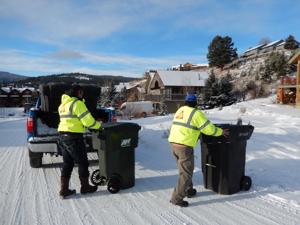Big Sky homeowners buy bear-aware garbage containers
When it comes to being bear aware, Big Sky is more than halfway there.
This week, thanks to homeowners associations, a sanitation company and the Wildlife Conservation Society, a second cluster of bear-proof garbage containers were delivered to Big Sky homeowners.
So far, Republic Services, a regional sanitation company, has distributed Kodiac-brand containers to 325 homes. By the time they’re finished, 60 percent of Big Sky residents will have made it more difficult for bears to scrounge through their garbage.
“Our goal is to get to 100 percent,” said WCS scientist Kris Inman. “Since the order of containers was so big, it had to happen in three shipments. The second shipment came at the beginning of December so it’s a slow rollout. But that’s OK because the bears are sleeping.”
Black bears have always wandered through Big Sky and the surrounding area. In recent years, they’ve been joined by grizzly bears as the grizzly bear population in Yellowstone National Park has grown and expanded.
That means more bears could come into conflict with Big Sky’s growing population if people aren’t aware of the things that attract bears, such as fruit trees, pet food, bird feeders, and of course, easily accessible garbage.
Human-bear conflicts have already tripled in the past 20 years, Inman said.
In 2013, a dozen black bears ran into problems in the Big Sky area. Nine were relocated, two were hit by vehicles, and one was shot illegally.
In the worst case, if bears become habituated to human food, agencies have to kill them.
But as more people became aware, they formed the Bear Smart Big Sky Council in early 2013 to address the problem and WCS facilitated the effort.
Initially, the transition to bear-proof cans was voluntary and eventually 20 percent of the community signed up.
Then the Big Sky, Town Center and Spanish Peaks homeowners associations voted to join the effort.
Republic Services made an initial capital investment of $300,000 to purchase Kodiac bear-proof containers, which resemble the regular blue garbage containers but have lid catches that bears can’t open.
“They worked really hard at getting the lowest rate possible for folks to change over to bear-proof cans. So depending on the service, it will add anywhere between $4 and $6 to their monthly fee.”
Jason Beach of Republic Services said the benefit of the Kodiac containers is their high-tech, lightweight construction that allows drivers to dump them automatically using adapted trucks.
“There’s a benefit to us because it keeps our drivers safe. In the past, a few drivers have come up on bears at the garbage cans. The Kodiacs have about a 70-percent dump success rate so drivers don’t have to get out,” Beach said. “This is the first time a community approached us and we try to stay responsive to the community.”
Inman knows that bear-proof garbage cans won’t help if people don’t use them properly. Sometimes people overfill them, forget to lock them or allow food stains and debris to build up on the outside.
So the Bear Smart Council will continue to educate people.
“Trash is the No. 1 attractant for bears. The hope is that we’ll see a reduction in conflicts once less trash is available,” Inman said. “Where there’s success with bears, it’s been community-led, and that’s what’s happened here.”


No comments:
Post a Comment